

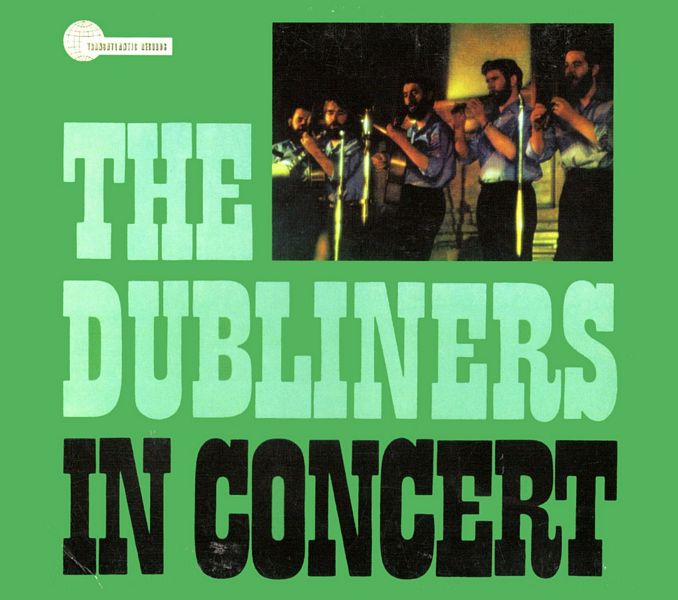 |
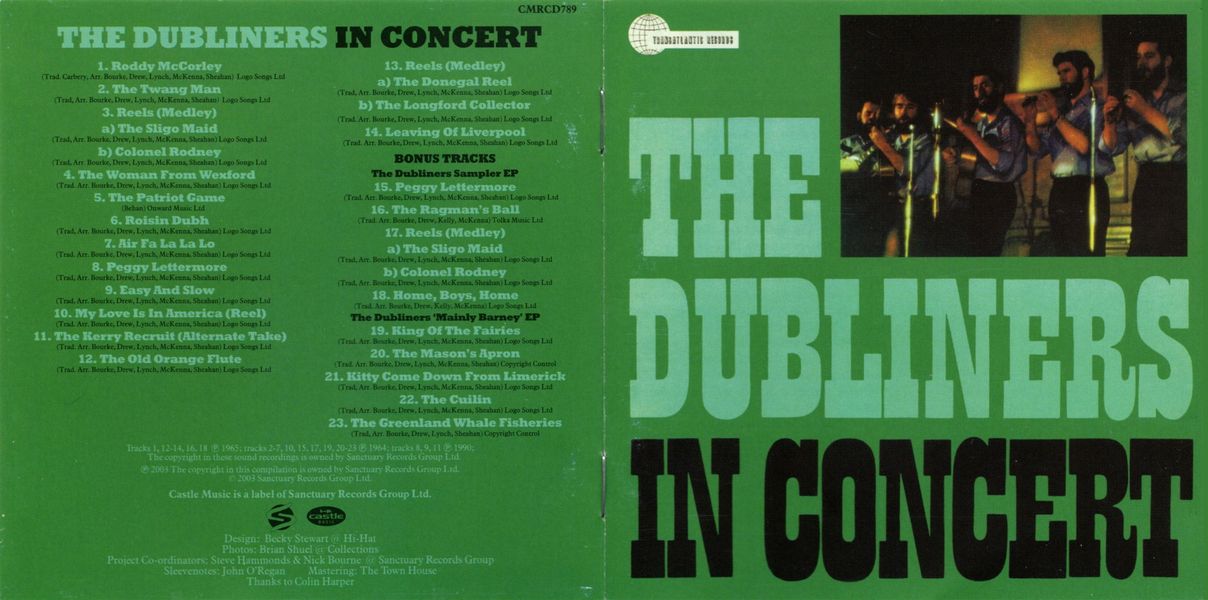
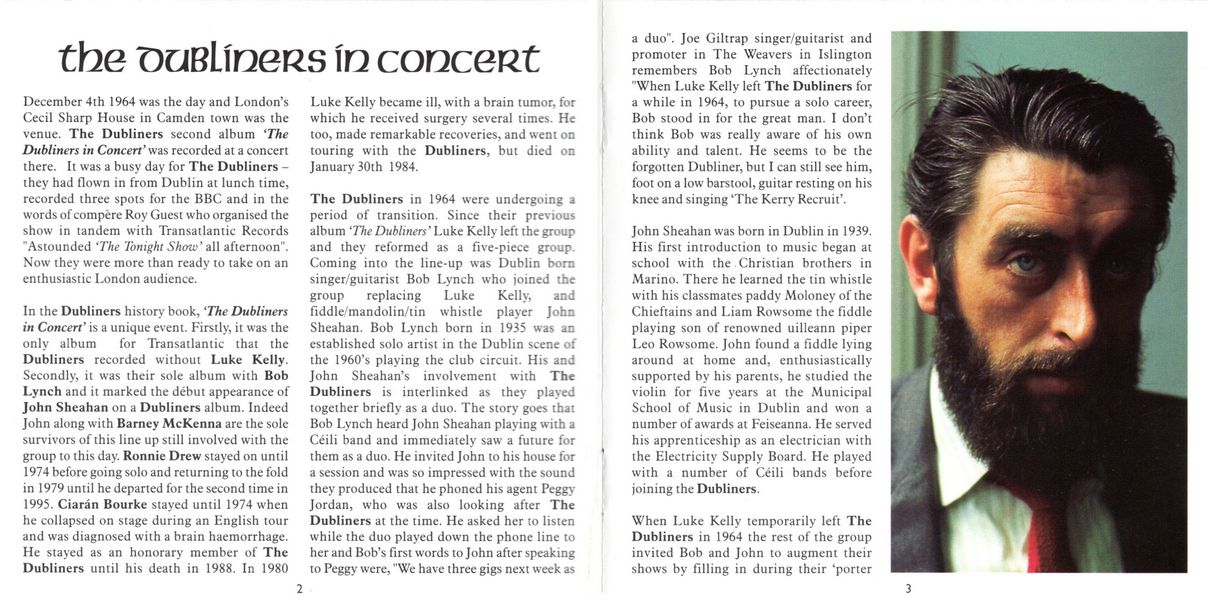 |
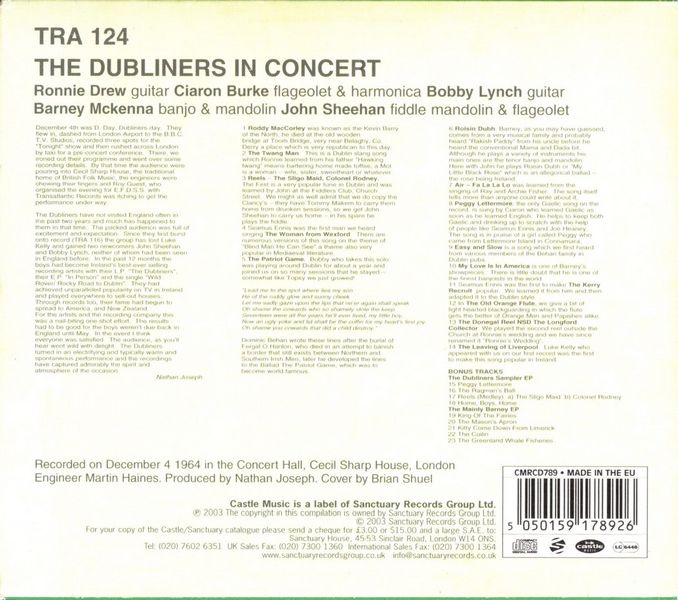
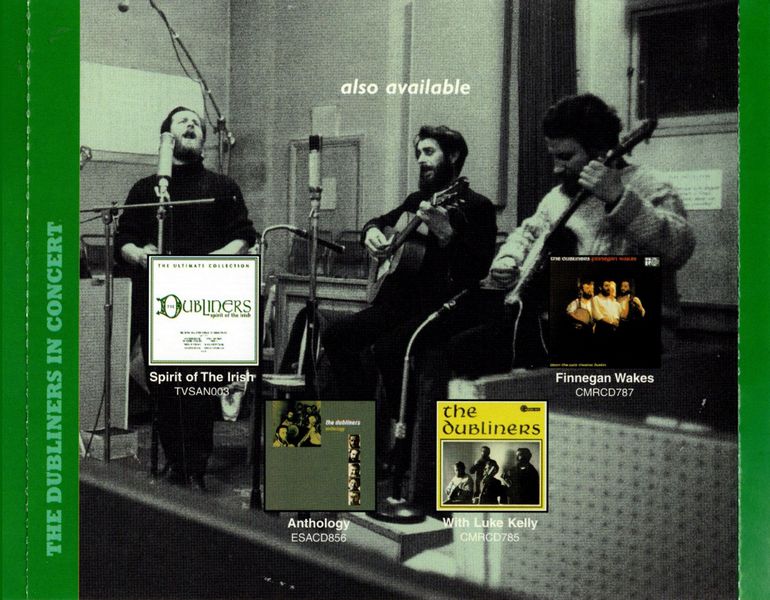
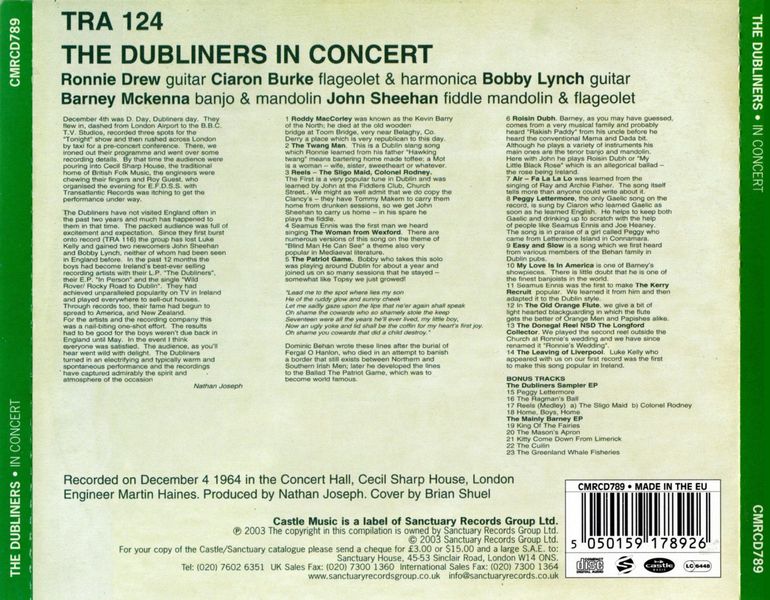
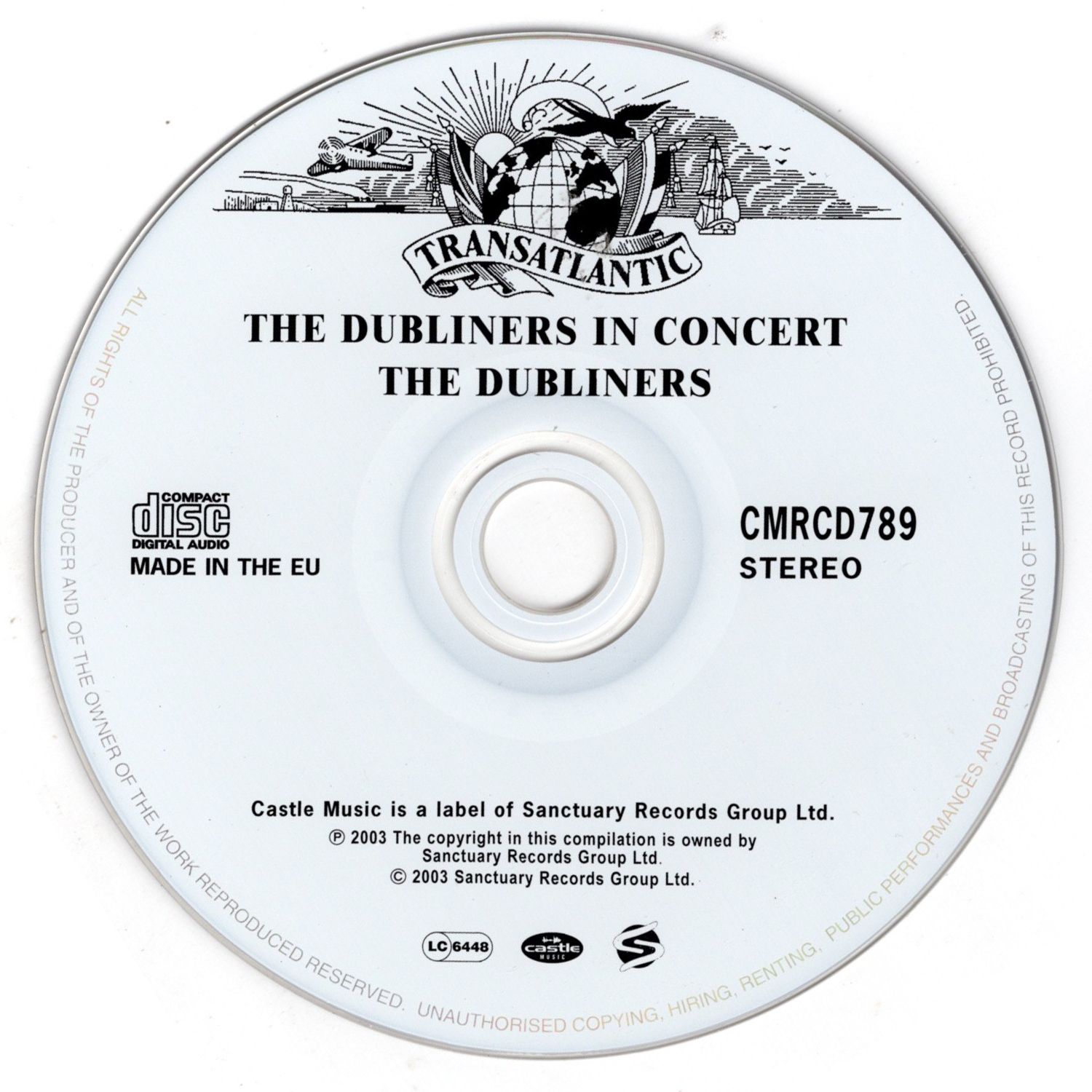
|
| more images |
Sleeve Notes
December 4th was D. Day, Dubliners day. They flew in, dashed from London Airport to the B.B.C. T.V. Studios, recorded three spots for the "Tonight" show and then rushed across London by taxi for a pre-concert conference. There, we ironed out their programme and went over some recording details. By that time the audience were pouring into Cecil Sharp House, the traditional home of British Folk Music, the engineers were chewing their fingers and Roy Guest, who organised the evening for E.F.D.S.S. with Transatlantic Records was itching to get the performance under way.
The Dubliners have not visited England often in the past two years and much has happened to them in that time. The packed audience was full of excitement and expectation. Since they first burst onto record (TRA 116) the group has lost Luke Kelly and gained two newcomers John Sheehan and Bobby Lynch, neither of whom had been seen in England before. In the past 12 months the boys had become Ireland's best-ever selling recording artists with their L.P. "The Dubliners", their E.P. "In Person" and the single "Wild Rover/Rocky Road to Dublin". They had achieved unparalleled popularity on TV in Ireland and played everywhere to sell-out houses. Through records too, their fame had begun to spread to America, Australia, and New Zealand. For the artists and the recording company this was a nail-biting one-shot effort. The results had to be good for the boys weren't due back in England again until May. In the event I think everyone was satisfied. The audience, as you'll hear went wild with delight. The Dubliners turned in an electrifying and typically warm and spontaneous performance and the recordings have captured admirably the spirit and atmosphere of the occasion.
Nathan Joseph
Roddy Mac Corley was known as the Kevin Barry of the North; he died at the old wooden bridge at Toom Bridge very near Belaghy, Co. Derry, a place which is very republican to this day.
The Twang Man. This is a Dublin slang song which Ronnie learned from his father. "Hawking twang" means bartering home-made toffee: a Mot is a woman-wife, sister, sweetheart or whatever.
Reels-The Sligo Maid. Colonel Rodney. The first is a very popular tune in Dublin and was learned by John at the Fiddlers Club, Church Street. We might as well admit that we do copy the Clancy's-they have Tommy Makem to carry them home from drunken sessions, so we get John Sheehan to carry us home. In his spare time John plays the fiddle.
Seamus Ennis was the first man we heard singing The Woman from Wexford. There are numerous versions of this song on the theme of "Blind Man He Can See." a theme also very popular in medieval literature.
The Patriot Game. Bobby, who takes this solo, was playing around Dublin for about a year and joined us on so many sessions that he stayed-somewhat like Topsy we just growed!
"Lead me to the spot where lies my son,
He of the ruddy glow and sunny cheek,
Let me sadly gaze upon the lips that ne'er again shall speak.
Oh shame the cowards who so shamely stole the keep.
Seventeen years were all the years he ever lived, my little boy,
Now an ugly yoke and lid shall be the coffin for my heart's first joy.
Oh shame you cowards that did a child destroy."
Domnic Behan wrote these lines after the burial of Fergal O'Hanlon, who died in an attempt to banish a border that still exists between Northern and Southern Irish Men; later he developed the lines to the ballad, The Patriot Game, which was to become world famous.
Róisín Dubh. Barney, as you may have guessed, comes from a very musical family and probably heard "Rakish Paddy" from his uncle before he heard the conventional Mama and Dada bit. Although he plays a variety of instruments his main ones are the tenor banjo and mandolin. Here with John he plays Róisín Dubh or "My Little Black Rose" which is an allegorical ballad-the rose being Ireland.
Air-La La La Lo was learned from the singing of Ray and Archie Fisher. The song itself tells more than anyone could write about it.
Peggy Lettermore, the only Gaelic song on this record, is sung by Ciaron. who learned Gaelic as soon as be learned English. He helps to keep both Gaelic and drinking up to scratch with the help of people like Seamus Ennis and Joe Heaney. The song is in praise of a girl called Peggy who came from Lettermore Island in Connemora.
Easy and Slow is a song which we first heard from various members of the Behan family in Dublin pubs.
My Love Is In America is one of Barney's showpieces. There is little doubt that he is one of the finest banjoists in the world.
Seamus Ennis was the first to make The Kerry Recruit popular. We learned it from him and then adapted it to the Dublin style.
In The Old Orange Flute we give a bit of lighthearted blackguarding in which the flute gets the better of Orange Men and Papishes alike.
The Donegal Reel and The Longford Collector. We played the second reel outside the Church at Ronnie's wedding and we have since renamed it, "Ronnie's Wedding."
The Leaving of Liverpool. Luke Kelly, who appeared with us on our first record, was the first to make this song popular in Ireland.
The Dubliners
December 4th 1964 was the day and London's Cecil Sharp House in Camden town was the venue'. The Dubliners second album 'The Dubliners in Concert' was recorded at a concert there. It was a busy day for The Dubliners — they had flown in from Dublin at lunch time, recorded three spots for the BBC and in the words of compere Roy Guest who organised the show in tandem with Transatlantic Records "Astounded 'The Tonight Show' all afternoon". Now they were more than ready to take on an enthusiastic London audience.
In the Dubliners history book, 'The Dubliners in Concert' is a unique event. Firstly, it was the only album for Transatlantic that the Dubliners recorded without Luke Kelly. Secondly, it was their sole album with Bob Lynch and it marked the debut appearance of John Sheahan on a Dubliners album. Indeed John along with Barney McKenna are the sole survivors of this line up still involved with the group to this day. Ronnie Drew stayed on until 1974 before going solo and returning to the fold in 1979 until he departed for the second time in 1995. Ciarán Bourke stayed until 1974 when he collapsed on stage during an English tour and was diagnosed with a brain haemorrhage. He stayed as an honorary member of The Dubliners until his death in 1988. In 1980 in concert Luke Kelly became ill, with a brain tumor, for which he received surgery several times. He too, made remarkable recoveries, and went on touring with the Dubliners, but died on January 30th 1984.
The Dubliners in 1964 were undergoing a period of transition. Since their previous album 'The Dubliners' Luke Kelly left the group and they reformed as a five-piece group. Coming into the line-up was Dublin born singer/guitarist Bob Lynch who joined the group replacing Luke Kelly, and fiddle/mandolin/tin whistle player John Sheahan. Bob Lynch born in 1935 was an established solo artist in the Dublin scene of the 1960's playing the club circuit. His and John Sheahan's involvement with The Dubliners is interlinked as they played together briefly as a duo. The story goes that Bob Lynch heard John Sheahan playing with a Ceili band and immediately saw a future for them as a duo. He invited John to his house for a session and was so impressed with the sound they produced that he phoned his agent Peggy Jordan, who was also looking after The Dubliners at the time. He asked her to listen while the duo played down the phone line to her and Bob's first words to John after speaking to Peggy were, "We have three gigs next week as a duo". Joe Giltrap singer/guitarist and promoter in The Weavers in Islington remembers Bob Lynch affectionately "When Luke Kelly left The Dubliners for a while in 1964, to pursue a solo career, Bob stood in for the great man. I don't think Bob was really aware of his own ability and talent. He seems to be the forgotten Dubliner, but I can still see him, foot on a low barstool, guitar resting on his knee and singing 'The Kerry Recruit'.
John Sheahan was born in Dublin in 1939. His first introduction to music began at school with the Christian brothers in Marino. There he learned the tin whistle with his classmates Paddy Moloney of the Chieftains and Liam Rowsome the fiddle playing son of renowned uilleann piper Leo Rowsome. John found a fiddle lying around at home and, enthusiastically supported by his parents, he studied the violin for five years at the Municipal School of Music in Dublin and won a number of awards at feiseanna. He served his apprenticeship as an electrician with the Electricity Supply Board. He played with a number of Ceili bands before joining the Dubliners.
When Luke Kelly temporarily left The Dubliners in 1964 the rest of the group invited Bob and John to augment their shows by filling in during their 'porter break' and the duo stayed on. With the addition of John Sheahan and Bob Lynch, The Dubliners assumed a new degree of musical virtuosity. Sheahan's classical training and his instrumental talents on fiddle, mandolin and tin whistle added a greater musical sophistication. Now he and Barney McKenna could attempt mandolin duets on the slow air 'Róisín Dubh' and he and Ciarán Bourke could double on tin whistles to back songs such as 'Roddy McCorley'. John Sheahan's fiddle playing added some extra snap out front and when Barney McKenna straps on the banjo the instrumental front line is further developed and refined. Here they cut and trusted with the best of them and produced a hugely distinctive and unique sound. Playing in Dublin at some concerts promoted by their mentor Peggy Jordan, her daughter Mary also often joined them playing the spoons and at one time The Dubliners boasted a six piece line up with Mary Jordan as the sole female member, a first in The Dubliners' lifetime.
With their first flush of youthful swagger intact, The Dubliners took no prisoners. This was a swashbuckling live band tossing out fire and brimstone Irish music shot through with heart and authority. They had the musical dexterity and attitude combined in one explosive package. 'The Dubliners in Concert' captures the new five-piece Dubliners line up at their fiery best. Musically there is plenty of light and shade. John Sheahan and Barney McKenna get their chances to shine individually with John's set of Reels: 'Sligo Maid'/ 'Colonel Rodney' and Barney's showpiece 'My Love is in America'. 'Róisín Dubh' is a powerful slow air arranged here as a mandolin duet and 'The Donegal Reel'/'The Longford Collector' saw them firing on all cylinders — and when they hit this kind of form the result was a fearsome sound.
Vocally it's a three-pronged attack of Ronnie Drew, Ciarán Bourke and Bob Lynch. Ronnie and Bob supply the corrugated iron with Ronnie's voice that was once described as sounding like 'coke crushed under a door'. On 'The Dubliners in Concert', Ronnie's vocal contributions 'The Twang Man'; 'The Woman from Wexford' (also recorded by The Dubliners nearest equals The Clancy Brothers and Tommy Makem), 'Easy and slow', 'The Old Orange Flute' and 'The Leaving of Liverpool' all feature the Drew hallmarks. Bob Lynch's rugged vocals suited The Dubliners fitting in to the rumbustious sound. Singing 'The Kerry Recruit' (also known as 'One Morning in March') and a sensitive reading of Dominic Behan's 'The Patriot Game', he fitted in successfully. Ciarán's more cultured tones suited the lilting 'Ar fa la la lo' and the Connemara Gaelic love song 'Peggy Lettermore' and the show opener 'Roddy MacCorley' a stirring patriotic marching song from Co. Derry.
Bob Lynch was soon to depart The Dubliners and return to a part time solo career in Dublin while working as a laboratory technician. He also tried his hand at song writing having one of his songs 'The Road Became a River' recorded by Dublin cabaret singer Carl Phillips. After a spell working as an entertainer in Canada he returned to Dublin and with Johnny Way (banjo), Paddy Fitzgerald (fiddle) and Maxie McEvoy (bass) recorded a solo album in 1980 for CBS entitled 'From The Land of Carolan' and played regularly on the local circuit. Sadly, however, Bob died in October 1982. Meanwhile, John Sheahan stayed on after 'The Dubliners in Concert' and leads the band to this day handling their business affairs as well as contributing musically.
After the release of 'The Dubliners in Concert', The Dubliners took part in Kevin Sheldon's legendary unfinished movie 'O'Donoghue's Opera'. Although this line-up of The Dubliners had lost the personality of Luke Kelly, they became a more musically proficient and sophisticated group. As a record of this brief stage in their career, 'The Dubliners in Concert' has them flying high — kicking up the dust. It neatly paved the way for the return of Luke Kelly and the recording of their next album 'Finnegan Wakes'.
As bonus tracks for this release, we have chosen two tracks from 'The Dubliners Sampler' — 'The Ragman's Ball' and 'Home Boys, Home', and four tracks from the 'Mainly Barney' EP featuring John on 'King of the Fairies', the seminal version of 'The Mason's Apron' featuring Barney and John Sheahan blowing hell for leather, a banjo solo on 'Kitty Come Down From Limerick', and the slow air 'The Cuileann' or 'the fair haired girl' an allegorical name for Ireland.
With all its raw instantaneous energy "The Dubliners in Concert' still kicks with freshness and youthful joie de vivre almost 40 years later. Producer Nathan Joseph summed up 'The Dubliners in Concert' succinctly — "The Dubliners turned in an electrifying and typically warm and spontaneous performance and the recordings have captured admirably the spirit and atmosphere of the occasion". Listening to 'The Dubliners in Concert' and these other tracks cut in 1964/1965 — Joseph's words are indeed prophetic — The Dubliners' performances gathered here are truly electrifying.
© John O'Regan-July 2003 for Sanctuary Records Ltd. Grateful thanks to John Sheahan, Harriet Roche, Joe Giltrap and Dennis O'Reilly.